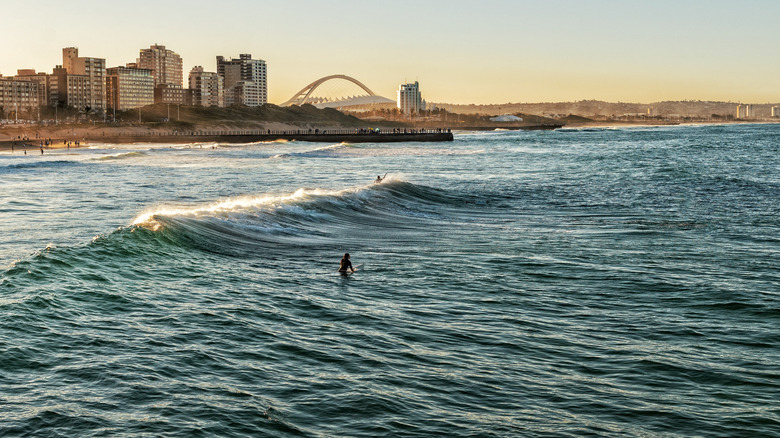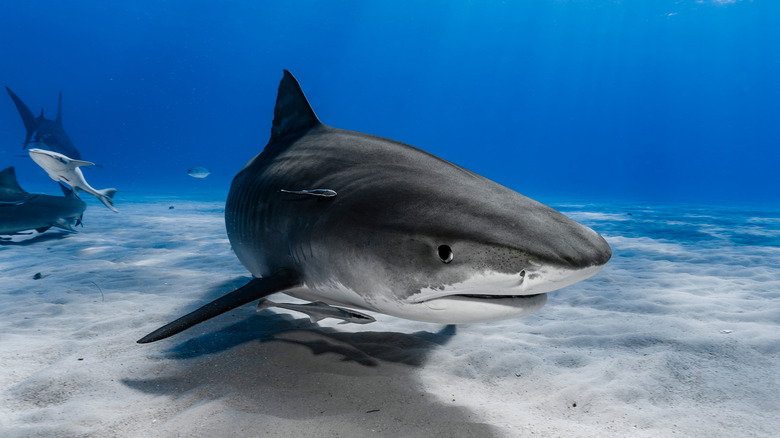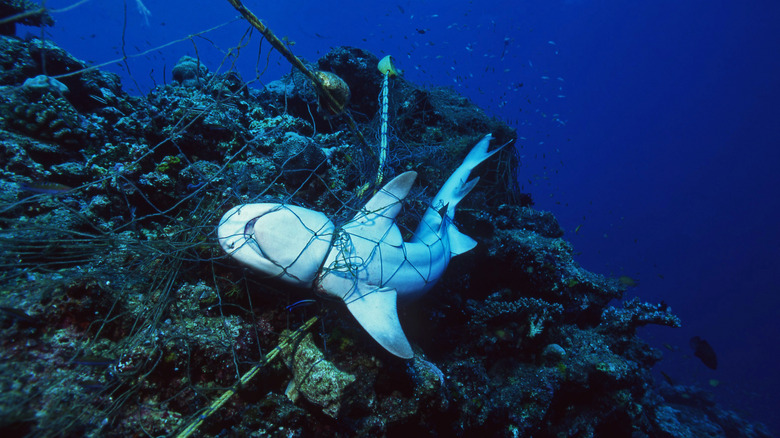How The Black December Shark Attacks Turned A Beach In South Africa Into A War Zone
Fortunately, we humans don't have any common natural predators. We are, in lots of ways, the ultimate predator ourselves. The study "The unique ecology of human predators," published by Science Magazine in August 2015, examines the unrivaled extent of our ravenous behavior in that regard. "Humans function as an unsustainable "super predator," which — unless additionally constrained by managers — will continue to alter ecological and evolutionary processes globally," authors Chris T. Darimont et al suggest.
The research states that humanity pursues mature adult predators of other species in quantities that cannot be sustained. Our impact on the environment, sadly, is unparalleled. Other carnivorous species, of course, hunt for food and their ultimate survival. Humans may not be a preferred dish for such species, but there have been tragic casualties.
Sharks are some of the most feared creatures on the planet. A whole generation swore off going back into the water for some time after watching "Jaws." Sadly, horror stories such as these have colored our impression of these sleek marine hunters, but the prejudice dates back further than that. In the 1950s, the Black December shark attacks resulted in something of a war against sharks.
What happened in Black December?
Generally speaking, we don't seem to be very attractive prey. According to Science Friday, the unassuming freshwater snail transmits the formidable schistosomiasis through parasites. As such, they're reportedly indirectly responsible for around 200,000 annual human deaths.
By contrast, the Australian Institute of Marine Science states sharks kill an average of 10 or fewer people annually. Whether through curiosity, feeling threatened, or for other reasons, shark attacks do happen, and they can be horrifying and potentially fatal.
As Oceana reports, a span of time between December 1957 and April 1958 was dubbed Black December in South Africa. It marked a period of unprecedented shark attacks in the region. The reason for this, the outlet goes on, seems to have been an increase in activity in the area, among visitors, fishing boats, and the sharks themselves. The Witness states that Black December would see a total of six people killed — Oceana says seven people died from shark attacks — with three surviving their frightful encounter with the creatures. Many sharks did not survive the deadly attempts to end the Black December attacks.
A terrible solution
Peter Liddle, The Witness goes on, was a lifeguard in the region. During ordinary times, he may have faced issues no more dramatic than revelers underestimating the strength or depth of the waters, but these were not ordinary times. What could be done to get these sharks out of the area? The South African navy, it seems, had the explosive and barbaric idea of trying to use depth charges – or explosives — against the amassing sharks. Needless to say, this endangered every creature in the vicinity and surely killed sharks and every other species alike.
The Witness reports that, prior to this, Liddle was armed with a .303 rifle. He sat on a "paddle-ski" and shot at sea creatures that looked to be sharks swimming in the waters around him. It all seemed to become progressively more barbaric. Ultimately, vast swathes of netting were deployed. Almost 100 sharks were killed by it in just days, the outlet goes on.
Per Australian Geographic, such nets continue to be used in areas where sharks and humans are likely to meet, one of them being South Africa's own KwaZulu-Natal. In order not to interrupt events such as the KwaZulu-Natal sardine run (winter passage of "hundreds of millions" of sardines and their natural predators, per Scientific American), they're taken away during such times. While they are deployed, though, they're as universally lethal to marine life as those Black December depth charges. Here's to the widespread application of more humane solutions.


